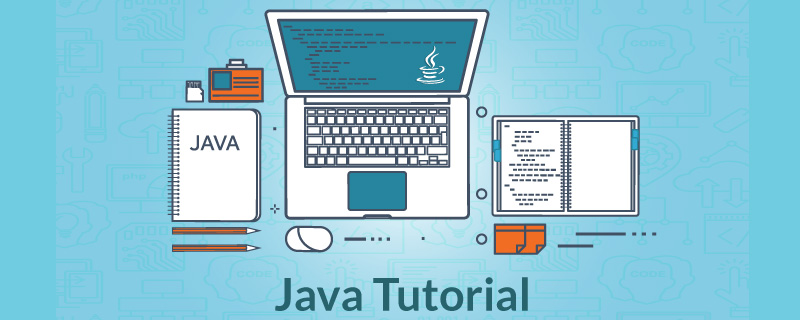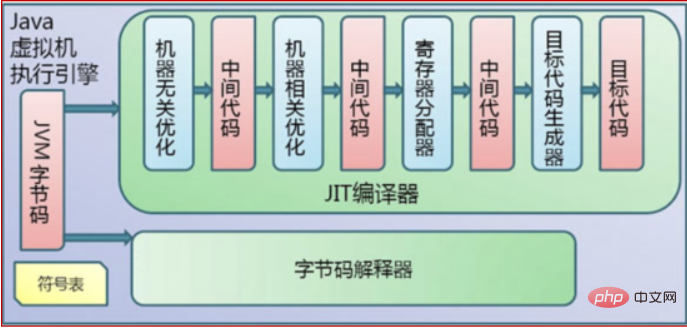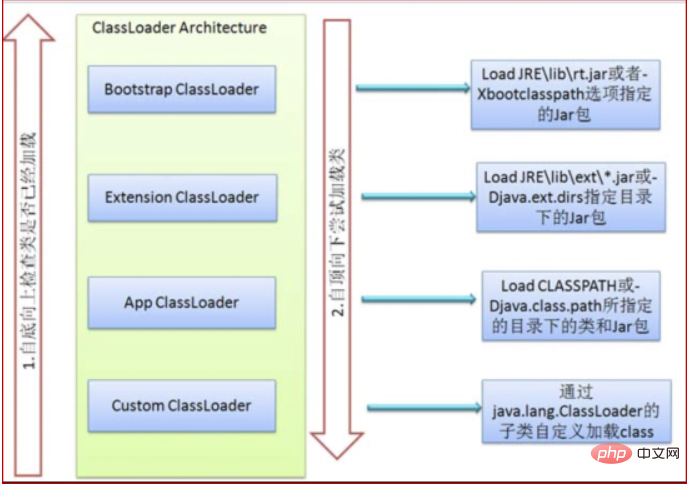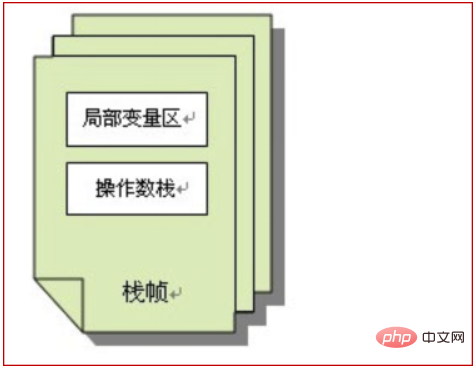What is the compilation order of java code
java code compilation sequence: first the source code enters the lexical analyzer, and then the token stream enters the syntax analyzer; then the abstract syntax tree is processed and then the semantic analyzer is performed; then the abstract syntax tree is annotated and generated using bytecode processor; finally generates jvm bytecode.

Java code compilation sequence:
Java code compilation is completed by the Java source code compiler. The flow chart is as follows:

The execution of Java bytecode is completed by the JVM execution engine. The flow chart is as follows:

The entire process of Java code compilation and execution includes the following three important mechanisms: 1) Java source code compilation mechanism; 2) Class loading mechanism; 3) Class execution mechanism
Among them, Java source code compilation consists of the following three processes: 1) analysis and input to the symbol table; 2) annotation processing; 3) semantic analysis and generation of class files
The flow chart is as follows:

The finally generated class file consists of the following parts:
1) Structural information. Includes class file format version number and information on the number and size of each part.
2) Metadata. Corresponds to information about declarations and constants in Java source code. Contains declaration information of classes, inherited superclasses, implemented interfaces, domain and method declaration information, and constant pools.
3) Method information. Corresponds to the information corresponding to statements and expressions in Java source code. Contains bytecode, exception handler table, evaluation stack and local variable area size, evaluation stack type record, and debugging symbol information.
Class loading mechanism
JVM class loading is completed through ClassLoader and its subclasses. The hierarchical relationship and loading order of the classes are as shown in the figure below:

1) BootStrap ClassLoader
is responsible for loading all classes in the jre/lib/rt.jar package in $JAVA_HOME. It is implemented by C and is not a ClassLoader subclass
2) Extension ClassLoader
is responsible for loading some jar packages for extension functions in the Java platform, including jars in the directory specified by jre/lib/*.jar or -Djava.ext.dirs in $JAVA_HOME Bag.
3) App ClassLoader
is responsible for recording the jar package specified in the classpath and the class in the directory
4) Custom ClassLoader
belongs to the application according to its own needs Customized ClassLoaders, such as tomcat and jboss, will implement ClassLoader according to j2ee specifications.
During the loading process, it will first check whether the class has been loaded. The checking order is from bottom to top, from Custom ClassLoader to BootStrap. ClassLoader checks layer by layer. As long as a certain classloader has been loaded, the class is considered loaded, ensuring that this class is only loaded once. The loading order is from top to bottom.
Class execution mechanism
JVM is based on the stack architecture to execute class bytecode. After a thread is created, a program counter (PC) and a stack (Stack) will be generated. The program counter stores the next instruction to be executed. Each stack frame is stored in the stack. Each stack frame corresponds to each call of each method. The stack frame is composed of two parts: the local variable area and the operand stack. The local variable area is used to store local variables in the method. and parameters, the operand stack is used to store intermediate results generated during method execution. The structure of the stack is as follows:

Related free learning recommendations: java basic tutorial
The above is the detailed content of What is the compilation order of java code. For more information, please follow other related articles on the PHP Chinese website!

Hot AI Tools

Undresser.AI Undress
AI-powered app for creating realistic nude photos

AI Clothes Remover
Online AI tool for removing clothes from photos.

Undress AI Tool
Undress images for free

Clothoff.io
AI clothes remover

AI Hentai Generator
Generate AI Hentai for free.

Hot Article

Hot Tools

Notepad++7.3.1
Easy-to-use and free code editor

SublimeText3 Chinese version
Chinese version, very easy to use

Zend Studio 13.0.1
Powerful PHP integrated development environment

Dreamweaver CS6
Visual web development tools

SublimeText3 Mac version
God-level code editing software (SublimeText3)

Hot Topics
 1378
1378
 52
52
 Perfect Number in Java
Aug 30, 2024 pm 04:28 PM
Perfect Number in Java
Aug 30, 2024 pm 04:28 PM
Guide to Perfect Number in Java. Here we discuss the Definition, How to check Perfect number in Java?, examples with code implementation.
 Random Number Generator in Java
Aug 30, 2024 pm 04:27 PM
Random Number Generator in Java
Aug 30, 2024 pm 04:27 PM
Guide to Random Number Generator in Java. Here we discuss Functions in Java with examples and two different Generators with ther examples.
 Weka in Java
Aug 30, 2024 pm 04:28 PM
Weka in Java
Aug 30, 2024 pm 04:28 PM
Guide to Weka in Java. Here we discuss the Introduction, how to use weka java, the type of platform, and advantages with examples.
 Smith Number in Java
Aug 30, 2024 pm 04:28 PM
Smith Number in Java
Aug 30, 2024 pm 04:28 PM
Guide to Smith Number in Java. Here we discuss the Definition, How to check smith number in Java? example with code implementation.
 Java Spring Interview Questions
Aug 30, 2024 pm 04:29 PM
Java Spring Interview Questions
Aug 30, 2024 pm 04:29 PM
In this article, we have kept the most asked Java Spring Interview Questions with their detailed answers. So that you can crack the interview.
 Break or return from Java 8 stream forEach?
Feb 07, 2025 pm 12:09 PM
Break or return from Java 8 stream forEach?
Feb 07, 2025 pm 12:09 PM
Java 8 introduces the Stream API, providing a powerful and expressive way to process data collections. However, a common question when using Stream is: How to break or return from a forEach operation? Traditional loops allow for early interruption or return, but Stream's forEach method does not directly support this method. This article will explain the reasons and explore alternative methods for implementing premature termination in Stream processing systems. Further reading: Java Stream API improvements Understand Stream forEach The forEach method is a terminal operation that performs one operation on each element in the Stream. Its design intention is
 TimeStamp to Date in Java
Aug 30, 2024 pm 04:28 PM
TimeStamp to Date in Java
Aug 30, 2024 pm 04:28 PM
Guide to TimeStamp to Date in Java. Here we also discuss the introduction and how to convert timestamp to date in java along with examples.
 Java Program to Find the Volume of Capsule
Feb 07, 2025 am 11:37 AM
Java Program to Find the Volume of Capsule
Feb 07, 2025 am 11:37 AM
Capsules are three-dimensional geometric figures, composed of a cylinder and a hemisphere at both ends. The volume of the capsule can be calculated by adding the volume of the cylinder and the volume of the hemisphere at both ends. This tutorial will discuss how to calculate the volume of a given capsule in Java using different methods. Capsule volume formula The formula for capsule volume is as follows: Capsule volume = Cylindrical volume Volume Two hemisphere volume in, r: The radius of the hemisphere. h: The height of the cylinder (excluding the hemisphere). Example 1 enter Radius = 5 units Height = 10 units Output Volume = 1570.8 cubic units explain Calculate volume using formula: Volume = π × r2 × h (4




